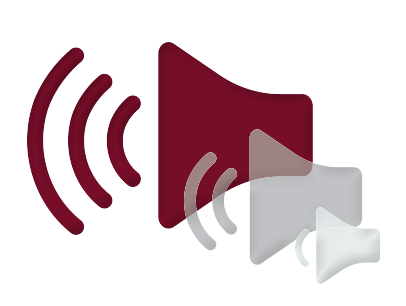
Click play to hear advice on where to add emphasis in your speech from the author Bill Brown, DTM.
The evaluation form in the Pathways learning experience asks you to rate and comment on the speaker’s vocal variety—how well they used the tools of tone, speed, and volume. But in what way did they use those tools? How many ways are there?
We are primarily evaluated on the level of vocal variety (do we use little variety, or a lot) and often on how to use vocal variety (volume, speed, etc.). The aspect that is less frequently discussed is where to use vocal variety.
To paraphrase George Orwell, all words are equal, but some are more equal than others. In every sentence you speak, some words are more important than others, and they need to be emphasized. That is a key purpose of vocal variety.
What makes one word more important than another? It boils down to its significance to the message that you are conveying.
Sometimes it is in a contrasting sense. It is, perhaps, a wet towel as opposed to a dry towel.
Sometimes it indicates a change of some sort. The Toastmaster is now a speech contest winner as opposed to a speech contest participant.
Sometimes it defines a salient point. He wore a red tie. Or perhaps, a very red tie.
Sometimes it indicates a critical point. But why did he do it?
However, all too often, particularly in news broadcasts when the reporters are reading a teleprompter, the speaker emphasizes words seemingly at random, just so they can sound interesting or non-monotonous. And they end up emphasizing the wrong words.
This, unfortunately, also occurs in Toastmasters speeches, primarily when the members are either reading their speech or are trying desperately to remember it. Both situations are usually because of a lack of familiarity with the speech.
Focus on communicating your message.
I have noticed that in casual conversation we tend to naturally emphasize the important words and phrases. But when we are delivering a speech or when we are in a more formal situation, perhaps one that is unusual for us, we get artificial. We overthink it. We focus on the words rather than the message. We focus on getting through it, rather than communicating. We focus on ourselves rather than our audience.
The key is to tap into your natural expressiveness. Change your focus from yourself to your audience. Focus on communicating your message.
Don’t give the speech, live the speech. Living it comes from practice. And practice. And practice.
Know it so well that you don’t need a copy of the text in front of you. Or, if you do, you don’t rely on it for the script, but for the key thoughts.
If you must read a speech, go through it and underline the key words and phrases—every sentence has them. This is where the emphasis should go.
I see a few situations that are abused more than others. First, there is a tendency to lower our volume at the end of sentences. I hear this a lot. This deemphasizes the final word or phrase. Sometimes this is appropriate, but frequently the most important word in a sentence is the last one. It needs to be emphasized, and, in order for that to happen, it needs to be loud enough to hear.
Second, if we are promoting a company or a product, we are, no doubt, mentioning the name of that company or product. Yet, because we are familiar with it, we have a tendency to rush through it. Sometimes it is so fast and slurred that it is difficult to understand.
Your audience members need to hear it and to sense the pride that you (hopefully) have in it. In other words, you need to emphasize it. But how?
I suggest that when you say the word or title, say it a little bit slower and a little bit louder than your other words. Not a lot. In fact, it may be imperceptible to the listener, but you will know that it is there. And you will, thus, say it with a little more pride. That is what will be perceived by your listener.
The bottom line here is that when you use vocal variety is just as important as how you use it. You inherently know which words and phrases need to be emphasized. You do it all the time in normal conversation. Take the time to know your message so well that you convey that natural emphasis. Don’t just give the speech. Live the speech.
Bill Brown, DTM is a speech delivery coach in Gillette, Wyoming. He is a member of Energy Capital Toastmasters in Gillette. Learn more at billbrownspeechcoach.com.
Related Articles

Communication
Why Vocal Variety Is So Valuable

Presentation Skills
Need to Make an Impact? Get Loud

Presentation Skills



 Previous
Previous

 Previous Article
Previous Article